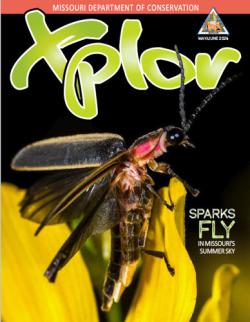
Xplor reconnects kids to nature and helps them find adventure in their own backyard. Free to residents of Missouri.


































Stay in Touch with MDC news, newsletters, events, and manage your subscription

Xplor reconnects kids to nature and helps them find adventure in their own backyard. Free to residents of Missouri.

A monthly publication about conservation in Missouri. Started in 1938, the printed magazine is free to residents of Missouri.


CAPE GIRARDEAU, Mo. -- “Conservation makes Missouri a great place to hunt, and the Missouri Department of Conservation (MDC) promotes safe, knowledgeable, ethical, and responsible hunting through its Hunter Education program and training,” said AJ Hendershott, MDC's Outreach and Education Supervisor for the Southeast Region. “Hunter Education classes fill up quickly so hunters who need to be Hunter-Ed certified should take the course early to avoid the typical fall rush for classes.”
Hunters born on or after Jan. 1, 1967, and who are 16 or older, must successfully complete an approved Hunter Education course to qualify to buy firearms hunting permits and participate in managed hunts. Youth 6 through 15 may hunt without Hunter Education certification when accompanied by a qualified adult mentor. Mentors are required to be Hunter-Education certified, unless exempt by age.
MDC recommends that youth begin hunting with an adult mentor to become familiar with hunting and terminology before taking the course. Hunters who have completed an approved Hunter-Education course in another state are not required to take Missouri’s Hunter Education course.
MDC also offers an Apprentice Hunter Authorization to let people 16 years of age and older try hunting without requiring certification as long as they hunt with an adult mentor who certified in Hunter Education, unless exempt by age.
MDC recently revised its Hunter Education curriculum to enhance student convenience and emphasize mentorship and hands-on training. The new, more flexible program is divided into two parts.
The first part provides necessary knowledge about hunting equipment, safety, and ethics through either an online course, a self-paced student manual, or through a four-hour classroom session. The second part consists of a mandatory four-hour hands-on skills session and a 35-question multiple-choice exam.
“Hunter Education students have three options to complete the knowledge part of the course,” explained Hendershott. “One option is through a convenient online course that includes audio, pictures, graphs, videos, and interactive animation to enhance and provide the best learning experience. Students must complete all of the chapter reviews as they go through the information, and then print their completion certificate.”
He added that a second option is for students to get a manual from an MDC office, or by completing an online order form. They then must study the information, which includes colorful pictures and graphs, and complete all chapter reviews.
“The third option is to register for, attend and complete a four-hour classroom session with a Hunter Education instructor,” said Hendershott.
The second part of becoming Hunter Education certified is to complete a hands-on skill session.
“After completing the first part of the course to gain the necessary information and knowledge, students must then complete a four-hour skills session with hands-on activities and video-based discussions,” Hendershott said. “The session includes a mandatory 35-question multiple-choice final exam that is based heavily on information from the knowledge learning options and with some from the skills session. After successful completion, students will receive a temporary certificate so they can immediately start hunting while their Hunter Education Certification card is being processed.”
The Missouri Department of Conservation has been providing Hunter Education since 1957 and has trained more than 1.1 million students. Since hunter education became mandatory in 1987, there has been a reduction of hunting incidents by over 70%. Missouri has and continues to be one of the top five states in annual hunter education graduate numbers.
For more information on Hunter Education contact your local MDC office or visit mdc.mo.gov/node/3095.